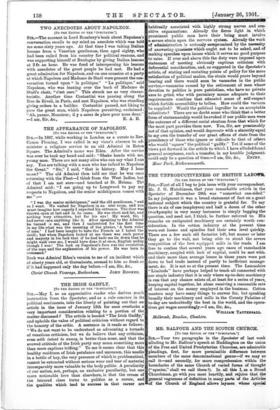THE IRISH GADFLY.
[To THE EDITOR OP THE "SPECTATOR."] Sru,—May I, as an appreciative reader who derives much instruction from the Spectator, and as a rule concurs in its political sentiments, take the liberty of pointing out that an article in the issue of January 12th for once overlooks a very important consideration relating to a portion of the matter discussed ? The article is headed "The Irish Gadfly," and upholds the value of political criticism without regard to the honesty of the critic. A sentence in it reads as follows: "We do not want to be understood as advocating a tornado of vexatious criticism, but we do believe that any criticism, even with intent to annoy, is better than none, and that the avowed attitude of the Irish party may mean something more than mere captious trifling." To me it seems clear that this healthy residuum of Irish petulance and unreason, this needle in a bottle of hay, the very presence of which is problematical, cannot be extracted without serious wear and tear of material incomparably more valuable to the body politic. A peculiarity of our nation, not, perhaps, an exclusive peculiarity, but one more noticeable here than elsewhere, is that the cream of the leisured class turns to politics as a career, and the qualities which lead to success in that career are habitually associated with highly strung nerves and sen- sitive organisations. Already the fierce light in which prominent public men have their being must involve a severe strain upon the nervous system. Already the work of administration is seriously oompromised by the necessity of answering questions which ought not to be asked, and of making speeches upon issues which it serves no good purpose to raise. If over and above this the duty were imposed upon statesmen of meeting obviously captious criticism with deferential consideration, and, as suggested in the Spectator's article, of stating and restating points of policy for the mere satisfaction of political malice, the strain would prove beyond bearing and there would soon be vacancies in the public service,—vacancies caused by the retirement of men whose devotion to politics is pure patriotism, who have no private axes to grind, who with pecuniary means adequate to their requirements combine that educated sense of self-respect which forbids accessibility to bribes. How could the vacuum be supplied? Would the political logroller be an acceptable substitute? There are no doubt some who think that a better form of statesmanship would be evoked if our public men were the outcome of a different social stratum from that which for the most part provides them now. You, Sir, are presumably not of that opinion, and would deprecate with a sincerity equal to my own the transfer of our great offices of state from the presidency of those who ignore or ridicule to that of others who would "square" the political "gadfly." Yet if some of the views put forward in the article to which I have alluded found general acceptance, such a transfer, in my humble judgment, could only be a question of time.—I am, Sir, &c., Eatrax.
.2kroor Park, .Rickmanswarth.


















































 Previous page
Previous page